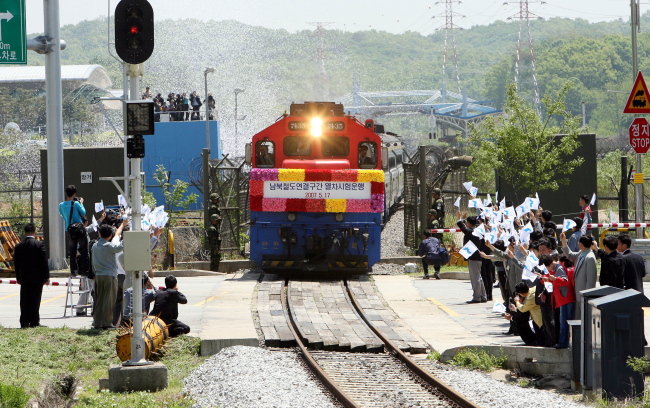[Newsmaker] Controversy escalates over budget plan for inter-Korean project
By Yeo Jun-sukPublished : Sept. 12, 2018 - 15:35
Controversy continues to mount over the government’s proposed budget for the implementation of April’s inter-Korean summit agreement, with opposition lawmakers accusing the government of scaling down figures to avoid public criticism.
Submitted to the National Assembly on Wednesday, the budget proposal estimates about 470 billion won ($417 million) would be needed next year to implement the Panmunjom Declaration agreed upon by President Moon Jae-in and North Korean leader Kim Jong-un.
But the main opposition Liberty Korea Party and its conservative allies said that implementation would require more funds than the government’s estimates, suggesting the Moon Jae-in administration downplayed the numbers by releasing next year’s budget only.
“The budget seems to show a fairly small amount of money will be needed right now, because it is only next year’s budget plan,” said Rep. Kang Seok-ho of the Liberty Korea Party, who chairs the National Assembly’s Foreign Affairs and Unification Committee.
“If we continue to implement the Panmunjom Declaration, the budget will increase at an astronomical pace,” he said.
Submitted to the National Assembly on Wednesday, the budget proposal estimates about 470 billion won ($417 million) would be needed next year to implement the Panmunjom Declaration agreed upon by President Moon Jae-in and North Korean leader Kim Jong-un.
But the main opposition Liberty Korea Party and its conservative allies said that implementation would require more funds than the government’s estimates, suggesting the Moon Jae-in administration downplayed the numbers by releasing next year’s budget only.
“The budget seems to show a fairly small amount of money will be needed right now, because it is only next year’s budget plan,” said Rep. Kang Seok-ho of the Liberty Korea Party, who chairs the National Assembly’s Foreign Affairs and Unification Committee.
“If we continue to implement the Panmunjom Declaration, the budget will increase at an astronomical pace,” he said.

The 2019 budget for the Panmunjom Declaration aims to support various inter-Korean social and economic programs, including extensive infrastructure projects such as linking roads and railways with North Korea.
According to the proposed budget, 290 billion won will be spent on reconnecting roads and railways, 114 billon won on a reforestation project and 20 billion won for social and cultural exchanges. Some 8.3 billion won has been allocated to establishing an inter-Korean liaison office in the North’s border town of Kaesong.
However, those estimates provide an inaccurate picture of the actual amount needed for the inter-Korean projects, opposition lawmakers warned. Not only does the budget deal with next year’s plan, it is also quite different from other estimates from private think-tanks, they added.
“Completing the modernization of railways and roads alone costs at least trillions of won,” said Kim of the Liberty Korea Party. “Particularly, there is significant disparity between the government’s cost estimates and those by private entities.”
South Korean security firm Mirae Asset Daewoo estimated in May that about 112 trillion won worth of investment would be required to rebuild North Korea’s infrastructure. City Group said 71 billion won would be needed for restoration.
Even the Ministry of Unification projected more than current estimates in its previous reports. In 2008, the ministry said about 14.3 trillion won would be needed to accomplish similar cross-border projects agreed upon at the second inter-Korean summit on Oct. 4 that year.
The Unification Ministry said the 2008 report was not an official estimate. It said the government will come up with a specific amount of money for each year’s budget after hammering out the details of the cross-border projects with North Korea.
“If we need more money the year after next, we can have discussions and come up with another plan. We never meant to avoid the lawmakers’ authority to review the budget,” a senior official from the Unification Ministry told reporters Wednesday under the customary condition of anonymity.
The budget scheme is a part of the government’s motion submitted to the lawmakers for ratifying the Panmunjom Declaration. The rival parties had agreed to discuss the matter after next week’s inter-Korean summit.
While cross-border projects are at a standstill due to sanctions imposed on North Korea, the initiatives are likely to be pushed incrementally in proportion to the progress in denuclearization talks between the US and North Korea.
By Yeo Jun-suk(jasonyeo@heraldcorp.com)








![[Graphic News] More Koreans say they plan long-distance trips this year](http://res.heraldm.com/phpwas/restmb_idxmake.php?idx=644&simg=/content/image/2024/04/17/20240417050828_0.gif&u=)
![[KH Explains] Hyundai's full hybrid edge to pay off amid slow transition to pure EVs](http://res.heraldm.com/phpwas/restmb_idxmake.php?idx=644&simg=/content/image/2024/04/18/20240418050645_0.jpg&u=20240419100350)







![[KH Explains] Hyundai's full hybrid edge to pay off amid slow transition to pure EVs](http://res.heraldm.com/phpwas/restmb_idxmake.php?idx=652&simg=/content/image/2024/04/18/20240418050645_0.jpg&u=20240419100350)

![[Today’s K-pop] Illit drops debut single remix](http://res.heraldm.com/phpwas/restmb_idxmake.php?idx=642&simg=/content/image/2024/04/19/20240419050612_0.jpg&u=)